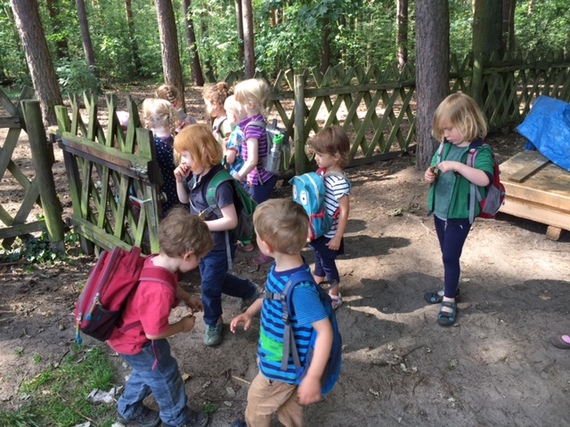It was my daughter's first day at the Waldkita, the forest pre-school where I had enrolled her during our summer in Berlin. Regardless of the weather, the kids spend all day outdoors, mostly in the woods where they climb trees and dig around in mounds of mud and sand. But what had seemed like a brilliant change from our hectic, overscheduled Manhattan life was starting to seem very scary on the ground. How could the caregivers possibly keep track of fifteen rambunctious toddlers in a thick German forest? I had been following the recent news story about the Japanese boy who was lost in a forest for days, and envisioned a similar scenario for my intrepid daughter who could wander off at any moment without looking back.
I sidled up to an expat American mother who, as it turns out, was equally worried, but about lyme-disease carrying ticks. "Are you worried they'll get lost in the forest?" I asked her in a hushed voice after all the chilled-out German parents had sauntered off. She nodded knowingly, "Well you could get one of those GPS tracking devices. But the waves might cause cancer." She was mulling over whether to dress her son in brightly-colored clothes which, on the one hand, would help him stick out in the forest, but on the other, might also provide more fodder for the dreaded ticks. She had studied the lyme disease maps in Germany and concluded that while Berlin was not in the high-risk zone, there was enough of a risk to warrant vigilance.
What is it that drives American parents to worry so much? And how did the Germans have so much trust that their kids would be alright? Once a well-meaning German pediatrician looked me straight in the eyes and told me, "I can tell by your fearful glance that you are an American mother." And this was coming from a culture that, at least according to national stereotypes, was so uptight that we've even borrowed their word for it: verklemmt.
It's a difficult question to answer but after spending the past two years in between the U.S. and the German-speaking world, I'm starting to think it's more than just the fear-mongering American media that gives undue coverage to toddler-snatching alligators and brain-eating amoeba infested lakes. As one German father told me after spending twenty years in America, "America is amazing when you want to do your own thing. But it's a terrible place if you need help. Like once you have kids."
When you have kids in America, you are very much alone. From the challenges of short or non-existent maternity leave right up to the anxieties around sky-rocketing college tuition, American parents are left to fend for themselves. Compare that to Germany, where parents have the right to 12-14 months paid leave. Every child older than three has the right to childcare, which is state subsidized and usually ends up costing no more than 100 Euros a month. And college education on average costs around 200 Euros per semester. No wonder German parents are so relaxed. They are part of a culture that tells them: you are OK, you will be taken care of, and so will your children.
So while American parents chaperone their children well beyond their first high school dance, German parents let their grade-school children go almost everywhere alone, including on subways and buses. As one American expat mother in Germany noted, this kind of "independent mobility" helps children feel more confident and empowered. Perhaps parental fear indirectly gets transferred to American children, who are more prone to violence, binge drinking, and drug use than their German peers. As every Catholic schoolgirl knows, the more rules and restrictions you have, the more attractive it is to break them.
German parenting styles aren't for the faint-hearted. I've watched two toddlers nearly claw each other apart on the playground while their parents stood by and shrugged. American playgrounds, on the other hand, are dominated by helicopter parents who hover over their children to make sure they never get hurt or hurt anyone else. While such an approach is most likely the byproduct of a conflict-averse, litigious society, this kind of early intervention never allows children to resolve their own conflicts because adult figures always step in. It sends American children the message: you can't handle your own problems, you aren't in control of your own lives. Perhaps it is not surprising we don't feel safe, not just because of America's more violent society, but because we never gained adequate self-confidence through solving our own problems. Because our parents always felt like nothing was there to protect us if they didn't.
